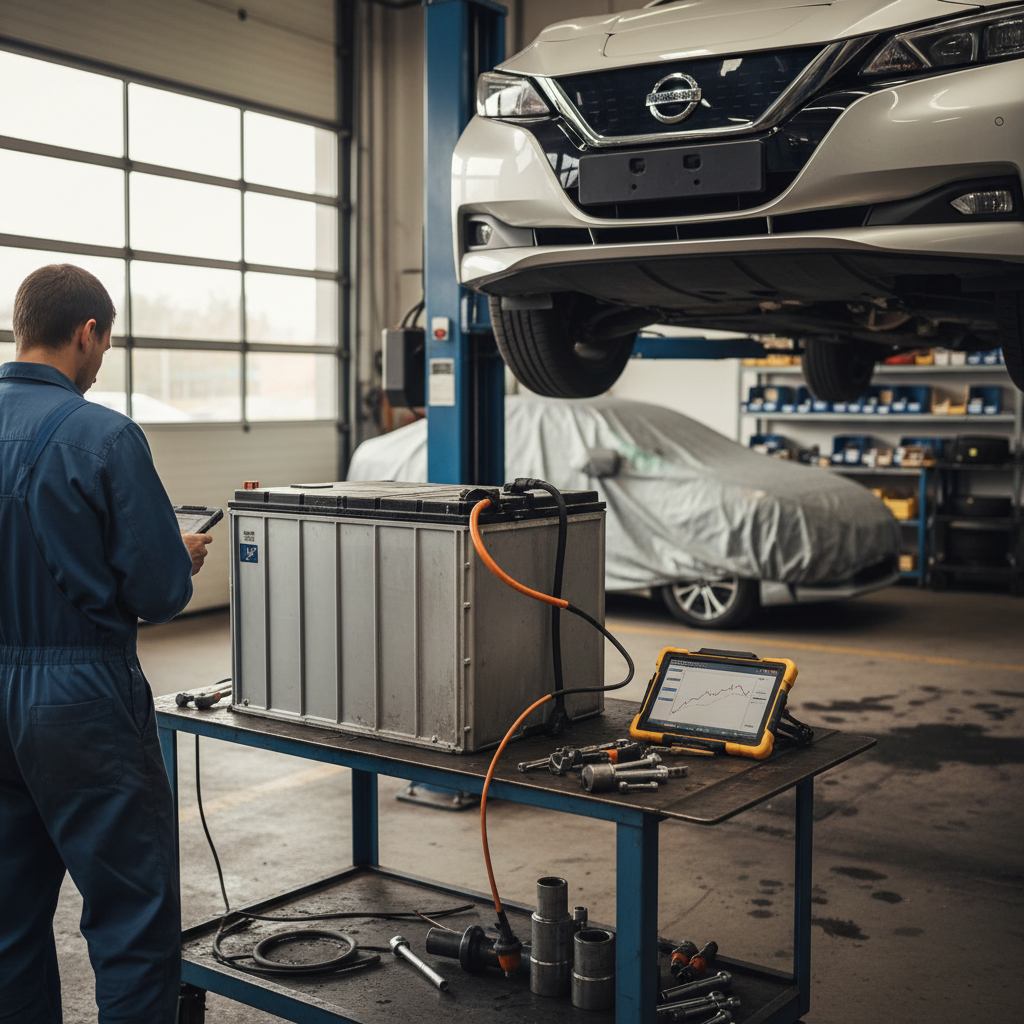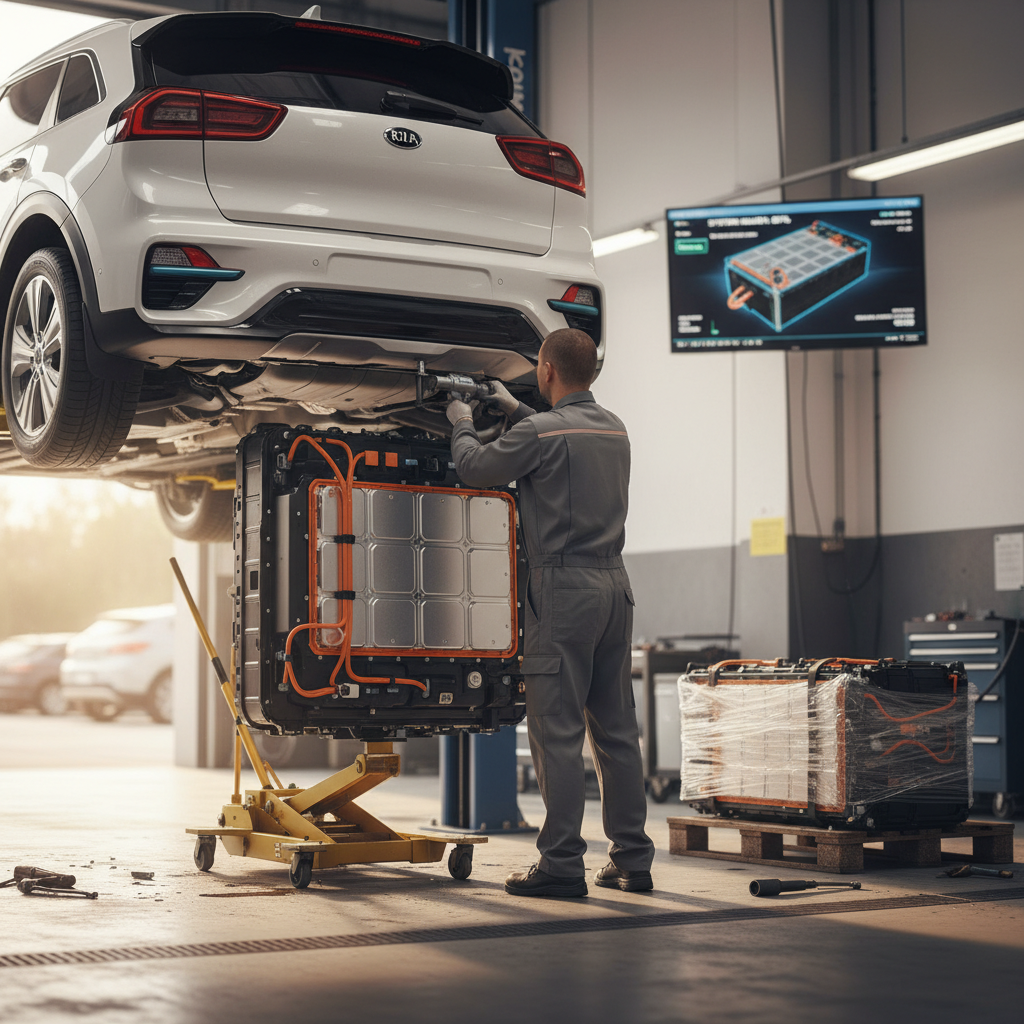If you own or are shopping for a Kia Niro EV, it’s natural to wonder about the **Kia Niro EV battery replacement cost**. The high‑voltage pack is the most expensive component in the car, and there’s a lot of internet folklore about five‑figure repair bills. The reality in 2025 is more nuanced: full pack failures are rare, warranties are strong, and you have more options than just writing a giant check to a dealer.
Quick context
Kia Niro EV battery replacement cost at a glance
2025 Kia Niro EV battery cost snapshot
Putting numbers to it: multiple 2024–2025 industry analyses of Kia and Hyundai EVs peg the **Niro EV’s 64 kWh pack** in the **$7,000–$9,000** range for the battery assembly itself, with **total installed cost commonly around $9,000–$12,000** once you add labor, diagnostics, and shop fees. That slots the Niro EV near the lower end of the typical EV battery replacement range for compact and midsize crossovers.
Sticker shock warning
What actually drives Kia Niro EV battery costs?
Two Niro EV owners can get completely different quotes for what sounds like the same job. That’s because **battery replacement cost is really a bundle of separate line items**. Understanding them helps you sanity‑check any estimate you’re given.
Typical Kia Niro EV battery replacement cost breakdown
Illustrative 2025 U.S. pricing for an out‑of‑warranty Niro EV pack replacement using OEM parts.
| Cost component | Typical range (USD) | What it includes |
|---|---|---|
| High‑voltage battery pack | $7,000 – $9,000 | OEM 64 kWh Niro EV pack or equivalent; price scales with pack size and availability. |
| Labor | $800 – $1,600 | Drop and reinstall pack, high‑voltage safety procedures, software updates, road test. |
| Diagnostics & testing | $150 – $300 | Battery health tests, fault tracing, post‑install verification. |
| Shipping & shop supplies | $100 – $250 | Freight for the pack, shop fees, high‑voltage PPE and consumables. |
| Recycling / disposal fees | $50 – $150 | Proper handling and recycling of the old pack if it’s not a core return. |
| Total estimated range | ~$8,100 – $11,300 | Typical 2025 out‑of‑pocket bill for a full pack replacement. |
Actual quotes will vary by dealer, region, and model year, but this breakdown shows how costs usually stack up.
Those numbers line up with broader 2025 EV data showing most full pack replacements fall between **$5,000 and $20,000** depending on vehicle size, with compact crossovers like the Niro EV clustered in the high single‑ to low double‑digit thousands. The Niro EV’s relatively modest 64 kWh pack keeps it away from the painful truck‑level bills you’ll see on something like an F‑150 Lightning.
Ask for a line‑item quote
Kia Niro EV battery warranty: what’s covered and for how long?
Before you worry about writing a check, you need to know whether you even should. Kia’s U.S. EVs come with a strong **EV system warranty**, separate from the standard powertrain coverage.
- Most Niro EVs sold in the U.S. have **10‑year / 100,000‑mile EV system coverage** from the original in‑service date, which explicitly includes the high‑voltage battery pack, electric motor, gear drive unit, and power electronics.
- Kia also provides **battery capacity coverage**: if the pack degrades below roughly **70% of its original capacity** within that 10‑year / 100,000‑mile window, Kia will attempt to repair or, if needed, replace the pack to bring it back to at least 70% capacity.
- This EV battery warranty is generally **transferable to subsequent owners**, unlike the older powertrain warranty rules that sometimes reduced coverage for second owners on hybrids. That’s a key distinction for used‑Niro shoppers.
- The warranty doesn’t cover abuse (like repeated deep discharges combined with extreme heat), collision damage, or unauthorized modifications to the high‑voltage system.
Always confirm for your VIN
The takeaway: if your Niro EV is **less than 10 years old and under 100,000 miles**, and the battery has a genuine defect or has degraded far more than it should, there’s a good chance Kia will address it under warranty. In that scenario, your **battery replacement cost is effectively $0**, aside from any incidental fees.
How long does a Kia Niro EV battery really last?
For most Niro EV owners, the more realistic question isn’t “What will I pay to replace the pack?” but **“Will I ever need to?”** So far, the data around Kia and Hyundai’s 64 kWh packs has been encouraging.
Niro EV battery life: what owners are seeing so far
Early‑fleet evidence suggests the 64 kWh pack is aging well.
Low annual degradation
70% is a low bar
Real‑world lifespans
How to keep your Niro EV battery healthy
All of this means that for a typical U.S. Niro EV owner, say, **10,000–12,000 miles per year**, you’re more likely to **sell or trade the car** before the battery truly needs a full‑pack replacement, especially if you bought new or nearly new.
Signs you might need a Niro EV battery repair or replacement
Complete pack failures are rare, but issues do happen. Knowing the difference between **normal degradation**, **fixable issues**, and **true pack failures** can save you thousands.
Common warning signs to watch for
1. Sudden, large range loss
Losing 5–10% of range over a few years is expected. Losing **30–40% in a single season**, with no weather explanation, can signal a serious problem or a failing module.
2. State‑of‑charge jumps or erratic gauge
If the gauge drops from 40% to 5% in minutes, or the car shuts down while still showing double‑digit charge, the battery management system might be seeing unstable cells.
3. Repeated warning lights
High‑voltage system warnings, reduced‑power modes, or traction battery codes that keep coming back after a reset deserve a professional diagnosis.
4. Charge rate suddenly slows and never recovers
Fast‑charging slowly in cold weather is normal. But if your Niro EV **never** charges faster than a trickle, the pack may be protecting itself or flagging internal issues.
5. Dealer‑verified capacity below warranty threshold
If a Kia dealer measures your pack and confirms capacity below the warranty spec (around 70%), that’s when **warranty replacement or repair** comes into play.
High‑voltage safety
Ways to lower Kia Niro EV battery replacement cost
If you are out of warranty and genuinely facing a failing pack, you still have levers to pull before you accept the first five‑figure quote. Here are the main strategies owners are using in 2025.
Cost‑saving options beyond a brand‑new OEM pack
Each path trades off cost, risk, and convenience.
1. Shop multiple Kia dealers
2. Use an independent EV specialist
3. Consider refurbished or salvage packs
4. Extended service contracts
Refurbished pack realities
Should you replace the battery or sell your Niro EV?
At some point, the math on a full pack replacement stops making sense. The key is comparing **repair cost** to the **vehicle’s current and post‑repair value**.
When replacement can make sense
- Your Niro EV is otherwise in excellent condition with relatively low mileage.
- The quote is at the **lower end** of the typical range (say, $7,000–$8,000) and you plan to keep the car for many more years.
- You live in a market where EVs retain strong resale value, and a fresh pack will clearly boost what the car is worth.
- You can secure favorable financing for the repair, spreading the cost over time.
When selling may be smarter
- The car is older, high‑mileage, or has multiple other looming repairs.
- Your quote is in the **five‑figure range**, especially from a dealer using only new OEM parts.
- You’re already considering a newer EV with faster charging, longer range, or more safety tech.
- You can get a strong trade‑in or cash offer that reflects the car’s remaining value without a new pack.
How Recharged can help if you’re on the fence
Buying a used Kia Niro EV: how to check battery health
If you’re shopping used, the goal is simple: **avoid being the one who has to pay for a future pack**. The good news is that there are concrete ways to assess Niro EV battery health before you sign anything.

Used Niro EV battery health checklist
1. Check the warranty start date and mileage
Ask for documentation showing the **date of first service** and current odometer. That tells you how much of the 10‑year / 100,000‑mile battery warranty is left.
2. Review displayed range at full charge
On a full (or near‑full) charge, compare the **indicated range** to the EPA rating for that model year. Big, unexplained gaps can warrant a deeper look, but remember to factor in temperature and driving history.
3. Ask for a recent dealer battery report
A Kia dealer can run a factory battery health test. For a car you’re serious about, paying for that report is cheap insurance against a future five‑figure surprise.
4. Look for warning lights or reduced power modes
Any current or recent high‑voltage system warnings are red flags. Don’t accept “we just cleared the code” without documentation of the underlying fix.
5. Consider third‑party diagnostics
Some independent EV specialists and tools can read **state‑of‑health (SOH)** metrics from the pack. These numbers aren’t perfect, but they’re better than guessing.
6. Prioritize transparent sellers
A seller who can’t or won’t provide battery history, service records, or warranty details is effectively asking you to take all the risk.
Where Recharged fits in
Kia Niro EV battery replacement FAQ
Frequently asked questions about Kia Niro EV battery costs
Bottom line: planning for Kia Niro EV battery costs
For most owners, the **Kia Niro EV battery replacement cost** will remain a theoretical number rather than an actual bill. The 64 kWh pack has proven durable so far, and Kia’s 10‑year / 100,000‑mile EV battery warranty does a lot of heavy lifting in the years when a failure would be most painful. Where things get tricky is later in life, when the car is older, out of warranty, and worth far less than a brand‑new pack.
The smart move is to treat battery health as a **core part of ownership and shopping**, not an afterthought. Keep your pack happy, pay attention to early warning signs, and if you’re buying used, insist on transparent battery data rather than vague assurances. And if you ever reach the point where a quote for a new pack lands on your desk, compare that number not just to your savings account but to the **value of the car with and without that repair**.
At Recharged, that’s exactly why every used EV we list, including the Kia Niro EV, comes with a **Recharged Score Report** that surfaces battery health, charging history, and fair‑market pricing in one place. Whether you decide to replace your pack, sell your Niro EV, or move into a different used EV, having that level of transparency is the best way to make a confident, financially sound decision.


